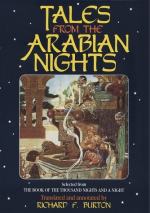value of thy father and mother moneys of such amount
as this sum. I only largessed thee with a mare
and a suit of clothes which was not defraying a debt
but presenting thee with a present and thereby honouring
thee with due honour. Then Alhamdolillah-laud
be to the Lord, who preserved thee and enabled thee
to win thy wish, and now arise and take thy parents
and return in safety to thy bride.” The
Prince hereupon thanked him and praised Allah for
the royal guerdon and favours and the fair treatment
wherewith he had been entreated; after which he craved
leave to receive his parents in charge and wend his
ways. And when permission was granted to him,
he wished all good wishes to the King and taking his
father and his mother in weal and welfare he went
his ways with them, in joy and gladness and gratitude
for all blessings and benefits by Allah upon him bestowed,
till he had returned to his bride. Here he found
that his father-in-law had deceased during his absence,
so he took seat in lieu of him upon the throne of
the kingdom; and he and his consort, during all the
days of their life in this world, ceased not eating
and drinking in health and well-being and eating and
drinking in joy and happiness and bidding and forbidding
until they quitted this mundane scene to the safeguard
of the Lord God. And here endeth and is perfected
the history of the Youth, the King’s son, and
the sale of his parents and his falling into the springes
of the Princess who insisted upon proposing problems
to all her wooers with the condition that if they
did not reply she would do them drain the cup of destruction
and on this wise had slain a many of men; and, in
fine, how she was worsted by and she fell to the lot
of this youth whom Allah gifted with understanding
to ree all her riddles and who had confounded her
with his question whereto she availed not to reply;
when his father-in-law died, succeeded to the kingdom
which he ruled so well.[FN#229]
Note to P. 82. {footnote [FN#219]]
The Musa (Moses) of the Moslems is borrowed from Jewish
sources, the Pentateuch and especially the Talmud,
with a trifle of Gnosticism which, hinted at in the
Koran (chapt. xviii.), is developed by later writers,
making him the “external” man, while Khizr,
the Green prophet, is the internal. But they
utterly ignore Manetho whose account of the Jewish
legislator (Josephus against Apion, i. cc. 26, 27)
shows the other or Egyptian part. Moses, by
name Osarsiph=Osiris-Sapi, Osiris of the underworld,
which some translate rich (Osii) in food (Siph, Seph,
or Zef) was nicknamed Mosheh from the Heb. Mashah=to
draw out, because drawn from the water[FN#230] (or
rather from the Koptic Mo=water ushe=saved).
He became a priest an An or On (Heliopolis), after
studying the learning of the Egyptians. Presently
he was chosen chief by the “lepers and other
unclean persons” who had been permitted by King
Amenophis to occupy the city Avaris lately left desolate




